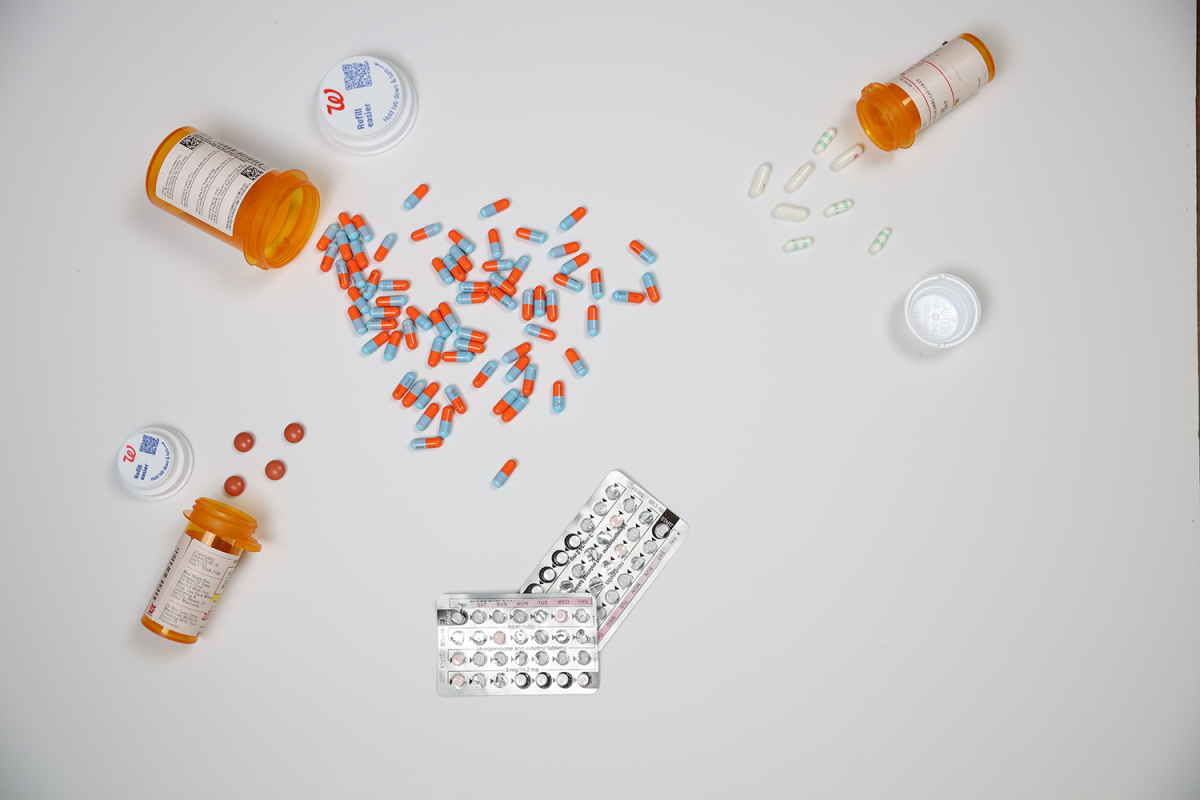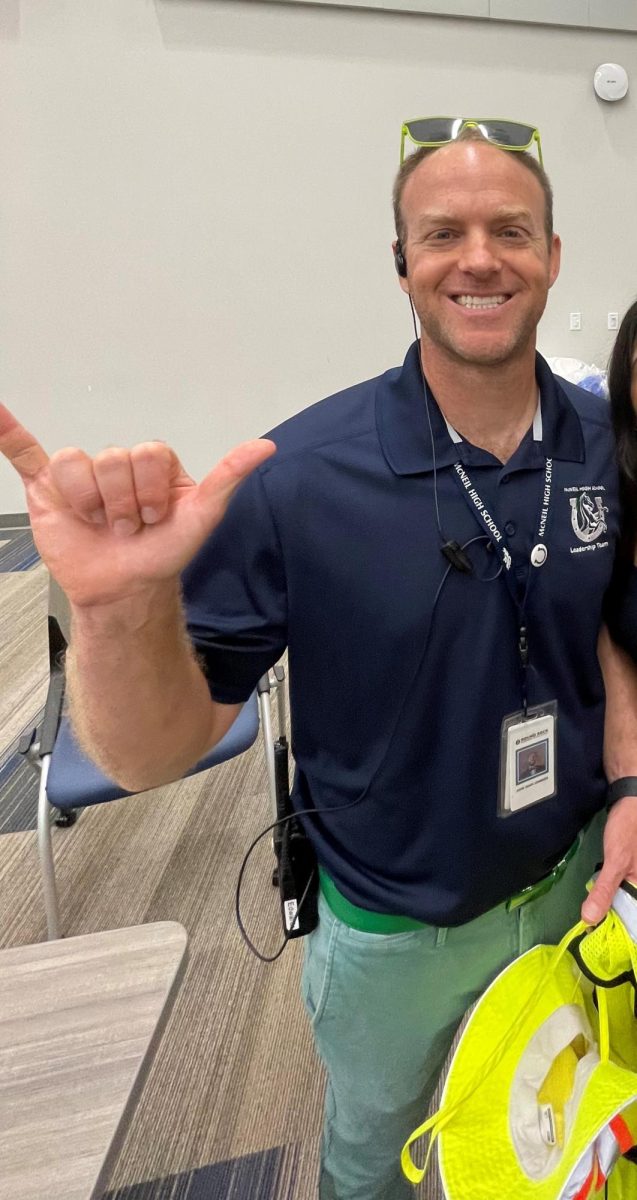Birth Control
Birth control, also known as contraception, is used for many reasons, the most common being pregnancy prevention. According to KFF Women’s Health Policy, 45% of women take birth control to prevent pregnancy, but 14% use it solely for other medical and personal needs.
“I’ve been on birth control now for two years,” junior Valerie Sepulvado said. “Mentally, birth control hasn’t affected me, but physically, I’ve noticed a huge difference in my pelvic area. I’m no longer in pain.”
Sepulvado said she used to experience a lot of bloating and pelvic pain. She and her mom decided to see a doctor after she missed her period for five months. Birth control was the first suggestion her doctor made, and Sepulvado doesn’t plan to make a change.
“The pill really cleared up my acne, which I wasn’t expecting,” Sepulvado said. “Overall, being on birth control has been great for me. I don’t have any more pain, and I get my period every month on time.”
According to the Endometriosis Foundation of America, nonsteroidal hormonal contraceptives (like birth control pills, shots, IUDs or implants) are first-line medical treatments for pelvic pain. Birth control regulates hormones because it contains estrogen and progestin, which reduce acne and regulate the body.
“I’ve been on birth control for about a year now,” senior Kasey Trinh said. “When I first started, I just threw up a lot. I started junior year, and I didn’t notice a mood change, but I was really stressed, so at first, I thought that could have been a factor as to why I was throwing up.”
Trinh later found out that it wasn’t stress causing her nausea—it was the birth control itself. While she wasn’t sure why, research from Medical News Today explains that progesterone, a hormone in birth control pills, can cause nausea. Some studies indicate that progesterone and estrogen contribute to this side effect by relaxing the smooth muscles, which can change how the stomach empties.
“It was pretty bad in the beginning,” Trinh said. “I would get up in the middle of the night and have to throw up. After it progressively got worse, I switched to a different type of birth control, and I haven’t had any problems since.”
There are many different side effects of birth control—some negative, some positive—but this medicine saves lives and helps women by preventing unintended pregnancies, managing reproductive health conditions and reducing the risk of certain cancers. In fact, birth control has been shown to reduce maternal mortality by 44% worldwide by preventing high-risk pregnancies. Additionally, the pill lowers the risk of ovarian and endometrial cancer by 30–50%, according to the National Cancer Institute. Beyond pregnancy prevention, 58% of women in the U.S. use birth control for medical reasons such as regulating periods, reducing menstrual pain and treating conditions like polycystic ovary syndrome (PCOS) and endometriosis.
Adderall
Adderall, a prescription drug containing amphetamine and dextroamphetamine is a part of a branch of medications called stimulants. According to MedicalNewsToday the stimulant drug Adderall eases ADHD symptoms which is what Adderall is commonly prescribed for.
“I’ve been on Adderall since I was in second grade,” junior Bowen Wheatley said. “I have ADHD, and the medicine helps me with staying focused in school and football.”
Adderall cuts hyperactivity, interrupting and fidgeting. Adderall not only improves physical activity according to HealthLine In the long term, it can improve mood and productivity.
“Even though Adderall has helped me a lot it’s caused me some physical hardships,” Wheatley said. “My weight fluctuates a lot because you lose your appetite when you’re on the medicine, so sometimes I gain a lot of weight, sometimes I lose a lot of weight, and it’s just hard. Especially when you’re trying to maintain weight while you’re playing sports.”
The reason Adderall causes users to lose weight is because it makes people less hungry and makes one’s body burn calories faster than usual. According to The Recovery Village, taking Adderall tells the brain that a person is “satisfied” and no longer hungry. It reduces feelings of hunger and makes someone feel more full when they do have a meal.
“I went off of Adderall my sophomore year and it was hard to adjust,” Wheatley said. “But the hardest part was trying to actually get back on it. Once you get back on it, your brain has to adjust again and you can get headaches and be tired.”
Wheatley said he was still able to get his work done but his grades did slip more than he would have hoped his sophomore year. The stimulant kept him awake which made getting back on it so hard for him because he was constantly exhausted, and when the medicine started to wear off, he became irritable. He described it as “getting used to it.”
According to MedicalNewsToday when the medicine wears off a person can feel the opposite effects to those it creates. This is because of the chemical imbalance left in their brain. This can make a person feel tired and sluggish, which is known as an Adderall crash.
“I usually just take the medicine at the same time every day,” junior Emily Vacek said. “It just helps me in the mornings with school and practice and it lasts the whole day.”
Vacek and Wheatley both play sports and notice that this medication helps them to tap into the right mindset to play and perform. Like most prescribed medicine, it is best to take it at the same time everyday to get the best benefit, but Wheatley would take it at a different time on Fridays during football season.
“If we had a game on Friday, I would take it in the afternoon,” Wheatley said. “It would really help me focus on the game, especially during warmups I would be more calm and prepared to play.”
Wheatley isn’t affected by taking the medicine in the evening versus in the morning but this doesn’t mean it can’t be dangerous for some. The normal side effects for Adderall users are headaches, high blood pressure appetite suppressant, etc. Taking it irregularly can lead to misusage though in some cases making the medicine more dangerous by increasing an individual’s tolerance. The danger of this is severe because the medication no longer helps manage the symptoms of ADHD. According to the American Addiction Centers, the misuse of Adderall can be hard on the heart muscles, lungs, vascular system and other internal organs causing anxiety, tremors, insomnia, hostility and psychosis.
“Since taking Adderall for the last year it’s done nothing but help me,” Vacek said. “I know many struggle with acne and weight fluctuation but I’ve noticed when I take it with a meal it doesn’t upset my stomach or disrupt my eating habits, and it helps me to be progressive and accelerate in school and as a person on a day to day basis.”
Stimulants like Adderall can be incredibly beneficial when used correctly, helping individuals with ADHD improve focus, productivity and overall well-being. As seen through the experiences of Wheatley and Vacek, the medication has allowed them to stay on top of their academics and athletics. However, stimulants also come with risks, particularly when misused. Other stimulant substances like caffeine, nicotine and even cocaine can quickly become addictive, and Adderall is no exception if taken irresponsibly. The line between proper use and dependence can be thin, making it essential to follow medical guidance. While Adderall has proven to be a life-changing medication for many, it serves as a reminder that all stimulants, even the most beneficial ones, should be approached with caution and responsibility.
Accutane
Isotretinoin, commonly referred to as Accutane, is a prescription drug usually taken for five to seven months for the purpose of clearing and controlling facial and body acne. Presented in a Dermato-Endocrinology textbook by Hull York Medical School professor Alison Layton, 85% of of patients who receive a dose of 0.5–1.0 mg/kg/day are virtually clear of their acne by 16 weeks, 13% require five or six months to clear and 3% require a longer course. Less than 1% of patients may need up to 12 months of continuous therapy.
Senior Ian Sendelbach had severe acne before his decision to take the drug, and previously tried topical tretinoin and other skincare products, none of which helping in the long run.
“I had lower self esteem,” Sendelbach said. “I feel like having something that you feel like you’ve tried to get over with however many treatments you’ve tried and it just doesn’t work, that can kind of harm other facets of your life. It’s like, if I’m trying at this thing and it’s not helping, it makes it to where you kind of think, why try anything?”
While the drug is certainly effective, it sees frequent side effects such as joint damage, severe dryness and worsened mental health symptoms. However, these didn’t affect Sendelbach’s choice.
“I didn’t consider quitting Accutane, not even a little,” Sendelbach said. “It was immediately obvious how much it was helping my acne and that absolutely outweighed the side effects.”
Both Sendelbach and senior Jackson Spainhour repeatedly put Aquaphor on their lips and moisturizer on their faces due to the overall epidermal dryness the drug causes.
“[Being on accutane] affected my self esteem a little bit because my lips were so dry,” senior Jackson Spainhour said. “If I talked for longer than two minutes without putting on Aquaphor, my lips would just hurt and start bleeding. Occasionally, people would be like ‘Dude, put some Aquaphor on.’”
Spainhour believes that despite the heavy price tag on Accutane through most healthcare providers, it outweighs what he would be spending on skincare products if he did not take Accutane.
“I think it’s worth the money you spend on the Accutane to never have to spend money on skincare,” Spainhour said. “Sometimes you’ll spend a ton of money on skincare, and it makes it worse or it does nothing, and I think it’s worth it to spend more on the Accutane and just wipe it out. If the skincare industry became more of a medication industry, that would be better.”
While Sendelbach believes his skin is much clearer than before, he maintains empathy for others who may be in his same situation before taking the drug.
“I didn’t like when people mentioned my acne at all, even in a ‘Oh, you really cleared up’ way,” Sendelbach said. “Because that means they were paying attention when it was bad and judging. I try not to mention people’s acne at all because I feel like that’s what I wanted when I did have bad acne.”
Antidepressants
Selective serotonin receptor inhibitors (SSRIs), are the most common type of antidepressants, which are prescription drugs used to treat major depressive disorder, anxiety disorders, addiction and other mental conditions. According to a study published in the journal Pediatrics, between January 2016 and December 2022, the monthly antidepressant dispensing rate to United States individuals aged 12 to 25-years-old increased by 66.3%, from 2575.9 to 4284.8. While they are a number one option for young adults struggling with mental conditions, the truth about whether antidepressants are the right option for students, is somewhere in the middle.
Senior Alexander Olson consistently spoke to a therapist before he began taking an SSRI.
“My mom’s a therapist, so she always suggested it for a lot of people,” Olson said. “She battled with a lot of mental disorders, and a lot of that was genetic so I also had a lot of it. So I got a therapist my freshman year, just to have somebody else to talk to about what was going on.”
Olson frequently reported intense anxiety which caused severe stomach cramps and went from doctor to doctor to find out what was wrong. Eventually, doctors diagnosed him with generalized anxiety disorder and prescribed him with sertraline.
“Different things would hit me at different times, depending on just where I was at in my life,” Olson said. “A lot of people think of anxiety as like, you’re just anxious about stuff that should make you anxious. But the way I had it, at least, was kind of like a blanket of anxiety on me at all times.”
The main side effect Olson felt in his experience with sertraline was emotional blunting, where his emotional “lows” were largely improved, yet his emotional “highs” were suppressed. Other common side effects for SSRIs are worsened depression or anxiety, nausea and headaches.
“For me, it was about finding balance,” Olson said. “I had to find the dosage to make sure that I wasn’t like a robot walking around, but also make sure I could handle the anxiety and emotions in my daily life that might make me off balance or make me upset.”
Junior Dayanna Powell echoed a similar experience with emotional suppression during her journey taking fluoxetine.
“For a long period of time when I first started the medication, I couldn’t cry,” Powell said. “It felt like my body wouldn’t let me. It hasn’t really affected me physically, but mentally, it’s made all my emotions neutral.”
However, despite Powell and Olson having mostly moderate side effects, a typical fear when someone begins to take an SSRI is the possible increased suicidality. The FDA reported that some children and teens had a small increase in suicidal thoughts when taking antidepressants, resulting in strict warning labels for the drugs.
On the other hand, Mayo Clinic posits that newer research indicates the benefits of antidepressants may be greater than the risk of suicide. Olson believes that they aren’t for everybody, and if one can, they should at least try it.
“The thing about mental health is it’s different for everybody,” Olson said. “I had a really good experience, but I know other people in my exact situation taking it, and it just doesn’t work out for them. It just really depends on who you are and your brain chemistry. For some people, it won’t work, and that’s okay.”
Major depressive disorder, anxiety disorders and other mental conditions that may be treated by an SSRI can almost debilitate a person in what may be the most back-and-forth time of their life, their teenage years. While not everybody may find the same results, general medical research reports that they are effective in treating these disorders when combined with the right dosage, and proper therapy if needed.
Finding the right dosage and the right medication was a long and drawn out process, but Olson believes that it was worth it in the long run.
“I’ve gotten really appreciative of it,” Olson said. “My life and well being has improved dramatically. Some people might need it for depressive episodes or certain points of life, but for me, I’ve had it all my life, no matter if my life’s been good or bad, it’s just kind of just been there with me at all times. I will probably take it for the rest of my life.”














